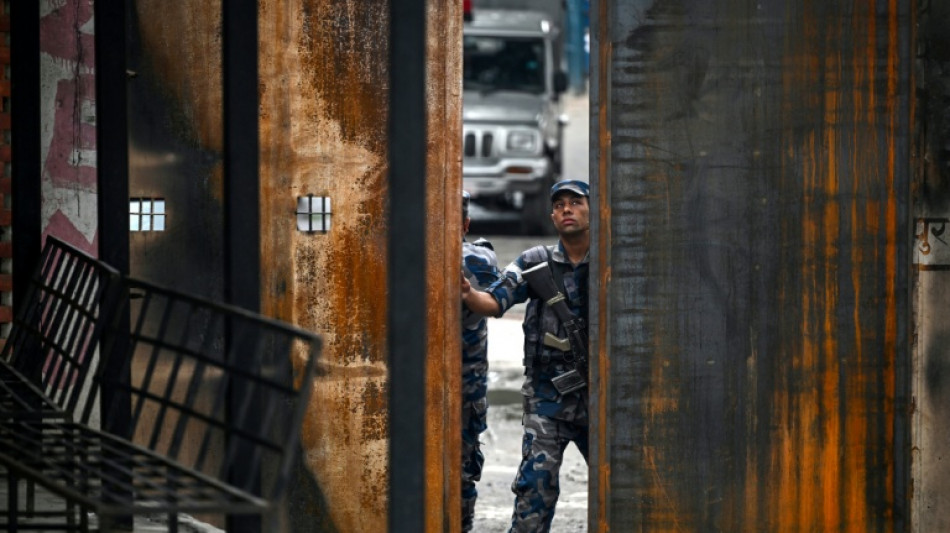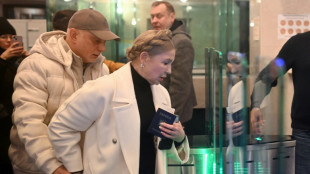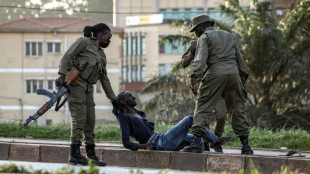

After mass Nepal jailbreak, some prisoners surrender
Days after escaping alongside 13,500 others in a giant jailbreak during deadly anti-corruption protests in Nepal, Avinash Rai rubbed his belly after a meal -- and strolled back into prison.
The 46-year-old convicted smuggler stunned relatives when he turned up at their Kathmandu home during last week's chaos, in which protesters torched the parliament and toppled the government.
The violence left at least 73 dead and saw security collapse across the capital, with inmates streaming out of fire-damaged jails countrywide.
"We were in a situation where saving our own lives was a challenge," Rai, with two small bags slung on his shoulders, told AFP just before he surrendered himself at the gates of Kathmandu's Nakhu prison.
"There were no cops here -— there was massive arson and vandalism. The gate was open after that."
He emerged from prison into violent crowds and fires burning across the city.
"It was a really bad time out," he said referring to the mayhem as he escaped. "Now I'm going in."
Youth-led protests in the Himalayan nation began on September 8, sparked by a short-lived ban on social media, but fuelled by anger at corruption and long-standing economic woes.
At least 19 people were killed in a crackdown.
A day later, anger over the deaths escalated, triggering an outpouring of rage nationwide -- with government buildings set alight and violence erupting in multiple prisons.
Rai, jailed for smuggling contraband across the India-Nepal border, has served 20 months of a 22-month sentence and appealed for the new government to "show some leniency".
- 'Cops searching' -
More than a third of the fugitives -- 5,000 out of 13,500 -- have been recaptured, police said.
Some were caught by Indian security forces as they tried to slip across the long, porous frontier.
Many still on the run include hardened criminals.
Others, like Rai, handed themselves back in -- many convicted of lesser offences or near the end of their sentences.
His friend Nagendra Shreshtha, who accompanied him back to jail, said Rai's family had been shocked when he appeared at their door.
"It was just crazy that all these people managed to come out of jail," Shreshtha said. "We advised him that it made sense to return on his own."
At the prison gates, Rai was not alone.
Som Gopali, 40, jailed for five years for assault and with nine months still to serve, hugged his tearful wife as he also handed himself in.
"It was a shock when Som phoned me," said his sister Preeti Yonjan, 42, who also came with him to the jail gate.
"I was dumbfounded and took time to process how he was out".
Many families described anguish at their relatives' return behind bars after a brief taste of freedom.
"He couldn't have stayed out with cops searching for him, and when he has nearly served his time," Yonjan said.
- Things must change'
Nakhu prison itself still bears the scars of the unrest.
Walls are scorched black, slogans of the "Gen Z" youth protesters are scrawled across the entrance, and community volunteers have been ferrying in donated mattresses, blankets and utensils.
"There is burnt soot everywhere," said local volunteer Savyata Bhakti, 22.
"The first night we heard about the escape was tense, and everyone was extra vigilant about safety."
Suresh Raj Aran, 40, whose 23-year-old son Sevak surrendered, said he had fled only to escape the violence inside prison.
"My son is innocent and we want him home with his parents, but only through a proper legal process," Aran said.
Outside the prison, families expressed hope that Nepal's new interim government, leading the country towards elections in March 2026, would improve conditions.
The World Bank says a "staggering" 82 percent of Nepal's workforce is in informal employment, with GDP per capita just $1,447.
"Things must change -- because if not now then when?," said Poornima Gopali, 29, waving as her brother Som returned inside.
A.Schuster--VZ



